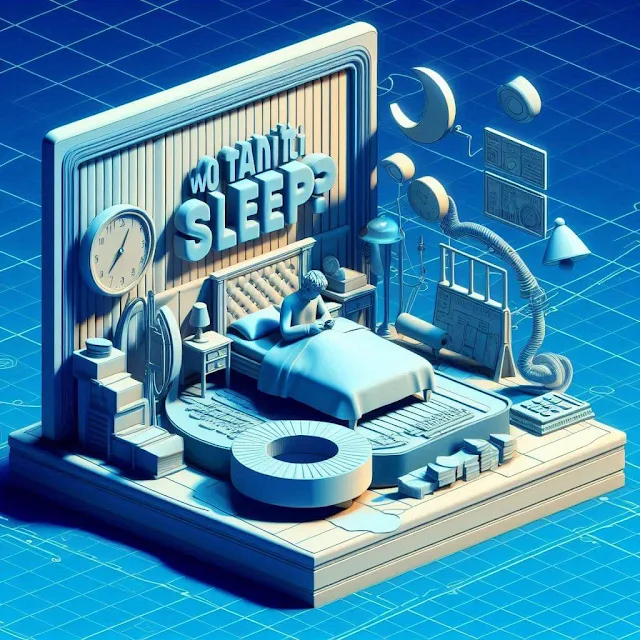- Get link
- X
- Other Apps
- Get link
- X
- Other Apps
1. What Exactly Is Insomnia?
Insomnia isn’t just
“not sleeping well.”
It’s a consistent struggle
to fall asleep,
stay asleep,
or wake up feeling rested.
I remember once,
around 3AM on a rainy Tuesday,
just staring at the ceiling...
wondering if I’d ever sleep again.
And I’m not alone.
In fact, according to the CDC,
1 in 3 adults reports
not getting enough sleep regularly.
But why?
That’s where it gets
a little more complicated.
2. Psychological Causes
Stress and Worry
It always starts
with a racing mind.
Deadlines, bills,
relationships,
world news...
All of it piles up
like noise in your brain.
Cortisol, the stress hormone,
ramps up and keeps
your body alert—
even when you're tired.
Dr. Shelby Harris,
a clinical psychologist,
explains that stress-related insomnia
can become chronic
if not addressed early
(Harris, Sleep Disorders in Adults, 2023).
Anxiety and Depression
What’s worse than not sleeping?
Fearing sleep itself.
Anxiety makes your heart race.
Depression dulls
your natural sleep drive.
Both are linked with
irregular melatonin production,
throwing your whole rhythm off.
A 2024 study in the Journal of Psychiatry & Sleep
found that 65% of patients
with major depressive disorder
also had insomnia symptoms.
3. Physical and Biological Triggers
Hormonal Imbalances
Especially during menopause,
thyroid disorders,
or PMS,
hormones like progesterone and estrogen
can fluctuate and wreck your sleep.
And let’s not forget melatonin,
our sleep hormone—
which declines naturally
as we age.
That explains why
so many people in their 50s and 60s
struggle with waking
at 4AM…
and not being able
to fall back asleep.
Chronic Pain and Illness
Pain doesn't clock out
at bedtime.
Arthritis, migraines,
acid reflux,
even restless leg syndrome—
they all interrupt your deep sleep cycles.
If you wake up often
and don’t know why,
it might be worth
talking to your doctor
about underlying conditions.
4. Lifestyle and Environmental Factors
Caffeine, Alcohol, and Food
That 4PM coffee?
Still in your bloodstream
by 10PM.
Caffeine has a half-life
of 5–6 hours.
That means if you drink
a double espresso at 4,
you’re still wired by midnight.
Alcohol might make you sleepy,
but it fragments REM sleep
and leads to early morning wake-ups.
Oh, and heavy meals
or spicy foods?
Expect indigestion
to wake you up
around 2 or 3AM.
Screen Time and Blue Light
Scrolling through TikTok
in bed?
Been there.
But blue light
from screens
inhibits melatonin release.
A 2023 study by Harvard Medical School
showed that even 30 minutes
of blue light exposure before bed
can delay sleep onset
by nearly an hour.
Yikes.
Sleep Environment
Is your room too hot?
Too noisy?
Too bright?
Even small light leaks
—from a charging cable LED—
can reduce melatonin levels
by up to 20%,
according to Stanford’s Sleep Lab (2022).
5. Neurological and Genetic Causes
Circadian Rhythm Disorders
Some people just
aren’t wired
to fall asleep at 10PM.
Delayed Sleep Phase Syndrome (DSPS)
is a real condition—
your internal clock
is out of sync
with society’s schedule.
This often affects teens,
but can persist into adulthood.
Genetics and Brain Chemistry
Yup, some of us
are just genetically wired
for lighter or more fragmented sleep.
A study published in Nature Genetics (2024)
identified over 57 gene variants
linked to insomnia risk.
It’s not your fault.
But it is your fight.
6. Medications and Substances
Prescription Drugs
Certain antidepressants,
beta-blockers,
and ADHD medications
have insomnia as a side effect.
Even some cold medicines
contain pseudoephedrine,
a stimulant.
Always check your meds.
Ask your doctor
if your sleep
could be a casualty.
Nicotine and Other Stimulants
Yes, vaping counts too.
Nicotine is a central nervous system stimulant,
which means it makes your brain
more alert,
not less.
People who smoke
are 4 times
more likely to have
difficulty staying asleep
(Sleep Foundation, 2024).
7. How to Reclaim Your Sleep
Now that you know
what’s really going on,
what can you do about it?
Track Your Sleep Patterns
Use a sleep diary
or an app.
Log bedtime, wake time,
and awakenings.
Patterns reveal more than guesses.
Limit Stimulants
No caffeine after 2PM.
Keep alcohol to one glass,
if any.
Light Hygiene
Dim your lights
1–2 hours before bed.
Use warm tones.
Consider blue light glasses.
Stay Consistent
Same wake-up time,
even on weekends.
Your body loves rhythm.
CBT-I (Cognitive Behavioral Therapy for Insomnia)
This is not just therapy.
It’s clinically proven
to treat chronic insomnia
more effectively
than sleep meds in the long term.
Find a licensed sleep therapist
or look into programs
like Sleepio (NHS-backed).
So, Why Can’t You Sleep?
There isn’t one answer—
and that’s the hard part.
It could be your phone,
your hormones,
your thoughts,
your genes...
or all of the above.
But the good news?
Once you pinpoint the cause,
you can reclaim the night.
Start small.
Track your patterns.
Change one thing.
Breathe.
And maybe,
just maybe,
tonight will be
the night you finally
sleep through.
anxiety
brain health
circadian rhythm
insomnia
melatonin
mental health
sleep disorder
sleep hygiene
stress
Location:
미국
- Get link
- X
- Other Apps



